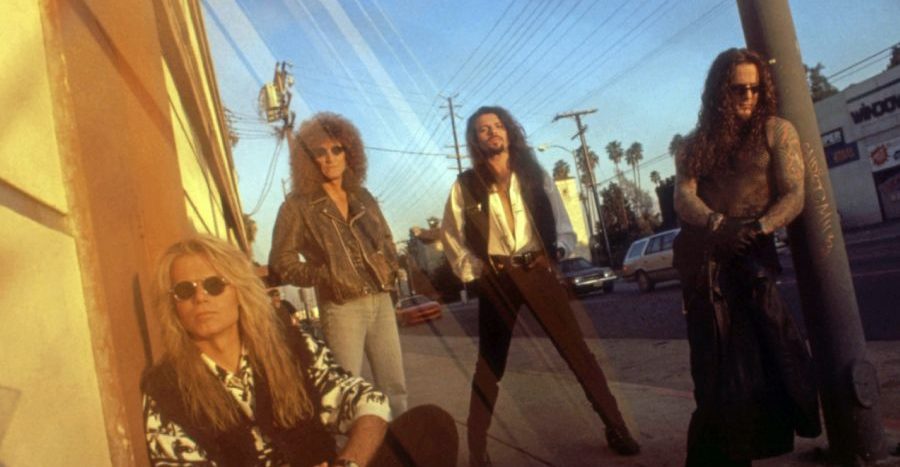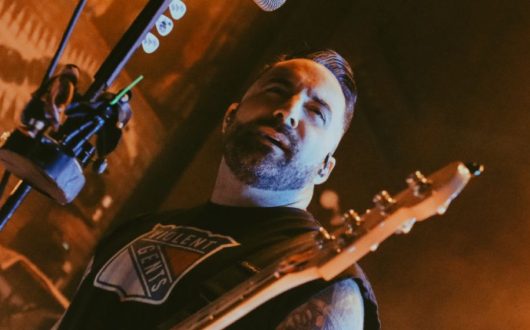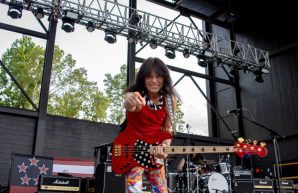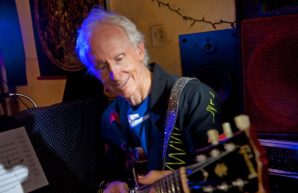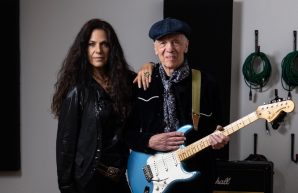Interview by Mark Lacey
Photos: William Hames
When Little Caesar’s first incarnation came to an abrupt halt in 1992, it coincided with David Coverdale bringing a temporary pause to Whitesnake, following the international success of their ‘Slip of the tongue’ album and tour. Following that break, Adrian Vandenberg, Rudy Sarzo and Tommy Aldridge came together to create a new project, bringing a new sound. When they parted company with James Christian in favour of seeking a grittier bluesy vocal, the stars aligned for Ron Young to join – and Manic Eden was born. The resulting album had limited commercial success at the time, but is still regarded as one of their finest pieces of work; the music being many years ahead of its time; and its 30th anniversary re-release could finally see it get the appreciation it deserves.
“It was incredibly intimidating to get into a room with these guys, and know what studios they’d been in, what stadiums they’d played in. Fortunately, all three of them are so down to earth and so unpretentious in any way, that it was really just like hanging out with any other bunch of musicians”

MGM: They will be many people who might not have heard of Manic Eden, and the album is now 30 years old. But people will be excited when they realise who played in the group, including the former members of the 1990 era of Whitesnake; Adrian Vandenberg, Rudy Sarzo and Tommy Aldridge.
Ron: It was such a flash in the pan for various reasons, so a lot of people have never heard the record. When they hear who’s involved, they’re like, really? Never heard about that.
MGM: I think you’re the only person alive to have attacked a Terminator and lived to tell the tale. Is that correct?
Ron: Yes, in Terminator 2, there’s that scene where Arnold Schwarzenegger goes into the bar and demands a guy’s motorcycle. He gets whacked in the head with a pool cue, and throws the guy through the window, and I’m the guy! That was a weird come-about. It was a bit of a fluke thing that I wound up becoming friends with James Cameron through Kathryn Bigelow, who I knew back in New York City before she became a huge director. It’s just such a weird world how you make friends of people. Then next thing everyone’s like, how do you know this person? I’m like, I don’t know. I’ve just known her for years.
MGM: Many people will recognise you most through your work with Little Caesar. During the band’s first incarnation you did an EP and two great albums album. But what was your path into music in the first place? Rumour has it that you were a nightclub bouncer at one point.
Ron: Well, not a bouncer. I’m not big enough to be a bouncer. I was a doorman. I let people in and out, if somebody misbehaved, then I’d call the bouncers. Music was salvation for me when I was a kid. I had a crazy upbringing with an alcoholic mum. I grew up in the period of time where music was such a vital thing culturally; way more so than it is today, in the sense that for all my friends, music was everything. You hung around, you listened to the music, you went out and stood in line to get tickets, you couldn’t wait for the concert. It was just such a big part of your life. Because of an older brother and sister, who turned me on to a lot of different forms of music; blues, rhythm and blues, soul, jazz, country, all that stuff; music just became this huge escape for me. Being a kid growing up in the suburbs south of New York City, you never think that you could actually seek a path in music. But I did the college thing, or started the college thing, and realised that the girls and the drugs and the music were a lot more appetizing than an actual career path. I got pulled out of attempting to become something in the biology field, which is my field of study, and moved into New York City and just decided, I’m going to go for this. I didn’t know if I really had talent. Talent is something other people dictate. I started auditioning for bands and getting the auditions, and I just kept doing it and doing it. Music was just everything to me, and still is just a massive part of my life.
MGM: What did you do musically before Little Caesar?
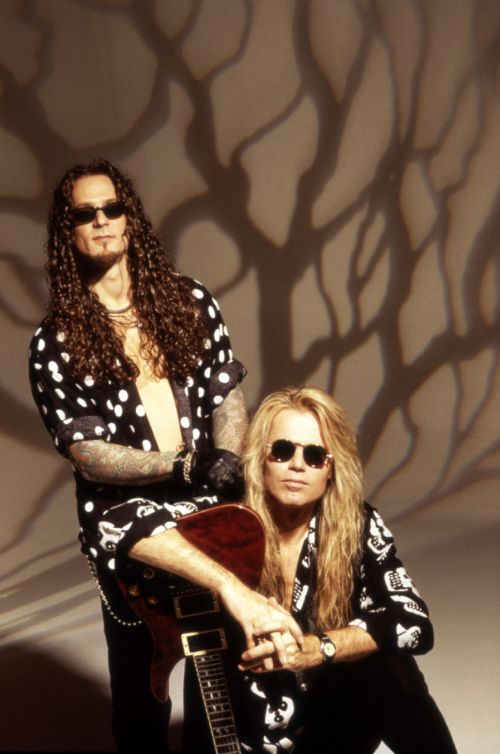
Ron: I grew up in New York City, so I got to catch the tail end of the glorious days of New York City’s music scene. This would be the late ’70s or early ’80s, and I was just a pup. CBGBs, Max’s Kansas City, the Peppermint Lounge, the Mudd Club, and all those great clubs were all still in their roaring heyday. It was an interesting time of music then because it was right at the start of when hip hop in New York City was starting to rise up. I was really always into roots music. I was in this rootsy rockabilly band and doing shows with the likes of Johnny Thunders. A lot of those guys all got into that big ’50s revival resurgence. A lot of musicians, a lot of punk rockers and rockabilly guys were all really big in the New York City music scene. I was in a band that toured, and we opened up for Stevie Ray Vaughan before he got a record deal. At that point, it was all dance music and hip hop. I moved out to California because there was a much more thriving rock n roll scene. When I got here, I messed around in a couple of little bands and then decided to put Little Caesar together.
MGM: Your released two excellent hard rockin’ albums through Geffen, but then, like many other bands, you were affected by the rise of grunge, and your brand of music became slightly less fashionable and much less appealing for the big record companies. It was reported at the time that Little Caesar weren’t able to court the attention on MTV because you looked like a bunch of Hell’s Angels.
Ron: Oddly enough, the business back story on the band is a real crash and burn, flame out thing really; not about music, but more politically, as many times happens in the music business. When you have the people that were involved with our project, guys like Jimmy Iovene, Bob Rock and John Kalodner, these titans of the music business, a lot of times they butt heads, and then the band winds up being the child in the divorce. The interesting thing is that at the time, there was this guy, Abbey Konowitch, who was the president of MTV. He caught the band at a show in LA and told John Kalodner and Jimmy Iovene, just get me whatever these guys put out, and I’ll put it on heavy rotation, which he did for six weeks. But then things happened; our label manager got fired for masturbating on a secretary; then David Geffen sold the record label, and we got caught in this weird window where our records were sitting in the warehouse never to be transferred out to the record stores. Just this whole perfect storm of everything that could happen did. It was an interesting time and everything completely changed. Here we were, this blues based, blue collar, gritty motorcycle band, in amongst the titans of hair metal. Oddly enough, that’s what got us a lot of attention with the record companies, because we did stand out amongst the crowd.
At the time, it was just such a weird confluence of stuff going on with the band. I was always preaching that the whole ’80s pop metal thing had to come to an end. It was just beating down the listener’s throats at MTV and on radio. There were a million bands that came out and got signed. A lot of them, I didn’t think were that good. But commerce being commerce, record companies just kept grabbing them and putting them out. There had to be a change in music. My opinion was that it was going to go back to more honest production, more blues-based. I was kind of right. When Soundgarden came out, they sounded a lot like Black Sabbath, and their record sounded like ’70s records. That’s the kind of record Little Caesar wanted to make, but we were fighting guys like Bob Rock and John Kalodner, who wanted us to be contemporary. Ultimately, that caused confusion with the listeners because we sounded polished, but we looked grungy.
MGM: The end of that era of Little Caesar back in ’92 would have been a difficult time for you. But it opened the door to this Manic Eden collaboration, because that was exactly the same point that Whitesnake had taken a pause, and Rudy, Tommy and Adrian had become available and were still wanting to record together. Initially they were working with James Christian from House of Lords as their vocalist, so how did you first become involved?
Ron: Well, from what Adrian related to me when I first talked to him, it was slated to be with James Christian, but the band felt that it was sounding too much like Whitesnake, and that’s not what they wanted to do. James is a great singer, but he’s more in that operatic, power pop melody stuff, and they wanted the record to be more of a bluesy, gritty and stripped-down kind of thing. They just felt with him fronting that band, it would turn too much into that Whitesnake realm, and they really wanted to get away from that. I listened to the songs, and I think about 60-70% were already written. Adrian said, I have a few more songs that need melodies and lyrics. I’d like you to finish them off. So, that was real appealing to me. I never got to hear anything that James did with the band. Adrian just played me music stuff, but he just wanted me to listen to it, and do my own thing to it, which I really appreciated.
MGM: It must have been a ‘wow’ moment to get the call, and be asked to play alongside three guys who had played and toured with some of the biggest rock bands in the world. Did you know them before you were introduced to the Manic Eden project?
Ron: No, I knew them as fans, and being a fan of their music. Here’s the thing. We were in this period where music completely changed. Little Caesar was completely ground to dust by the music industry. I was in this really dark, ‘what the hell am I going to do next thing?’ and I get this phone call. These guys, collectively, had sold tens of millions of albums. And me, I’m still eating ramen in Los Angeles.
I was really excited about it. It was incredibly intimidating to get into a room with these guys, and know what studios they’d been in, what stadiums they’d played in. Fortunately, all three of them are so down to earth and so unpretentious in any way, that it was really just like hanging out with any other bunch of musicians. I really appreciated that because I’ve always been the guy that’s very honest about his music, and about who he is. To me, a rock star is just a guy who sell a lot of records. Coming out of LA in the ’80s, everybody was trying to pass this impression that they’re this rock star, as in we hang out with all these gorgeous women, and we party all night and all day long. To me, real rock stars were just guys that got up and they sang, and they moved a whole lot of people in front of a whole lot of people. It wasn’t about the behaviour. That became a stereotype. To see these guys; Tommy bicycles 40 miles a day, Adrian eats really healthy, and so does Rudy. And I’m eating ramen and hamburgers. It really was a bit of a shock. They wanted to start recording at 10-11am. I’m like, I don’t even go to bed until 3am. It was a culture shock thing.
MGM: Something that will surprise people who have not yet heard this album, is that music is quite far removed from the usual genre you’d expect. All the instrumentation is really quite loose, funky and groove orientated, and quite different to Adrian, Rudy and Tommy’s usual playing styles. Anyone expecting classic rock, will be very surprised. How would you describe the sound?

Ron: I always thought it was like progressive blues. There’s a little bit of Cream, there’s a little bit of Lenny Kravitz; it’s taking blues and giving just a little bit of a twist to it. And it’s mixed with some of that AOR, ’80s rock blended in as well. But that’s what struck me about it; it wasn’t easily pigeonholed into anything that was going on at the time. Oddly enough, that’s one of the things that didn’t really help its longevity, because when we did the record, it was originally a record deal in Japan. At this time in 1993-94, grunge did not take off in Japan at all. Everybody still worshipped Aerosmith and Motley Crue and hair metal. We did this record, and Adrian got full creative control, and when we delivered it to the label, they were like, what’s this? They were expecting a Whitesnake record, and it was not a Whitesnake record. They didn’t know what to do with it. Then when we started trying to get it distributed in the US and in Europe, but it was weird; 80% of the labels didn’t even want to take a meeting with us when they heard who was involved, because they’d shifted their consciousness and everything they put out had to be from Seattle. We’re like, at least give it a listen. So many of them just didn’t even want to bother. They said, it’s going to be too much of an uphill push to get people to look at you guys as being anything but Whitesnake with a different singer. It was a really bizarre thing.
MGM: There’s a lot of things on this album that will remind people of Cream, Mountain and Hendrix. ‘Do Angels Die’ and ‘When the Hammer comes down’ have both some very Hendrix-style references. But there are other areas that feel more akin to the Chilli Peppers, Mr Big or Living Colour. It’s such a diverse album. ‘Give Me A Shot’ could easily have been a Richie Kotzen tune. This may be the album’s 30th Anniversary, but it’s arguably more applicable to today’s market than it maybe was then?
Ron: I totally agree, and that’s why I was so pleased to see the re-release. I think the 30 years has set people’s ears up to listen to this and be a little less taken aback from it than they would have been on the first release.
MGM: How involved were you in the decision to re-release the album?
Ron: I wasn’t involved at all in this. In fact, I had taken a six-month Facebook break because I needed to get my sanity back, and get back to the analogue world. I got this message from Lauren from Little Caesar saying, hey, we got this message on the Little Caesar page from the manager of Manic Eden and Adrian Vandenberg saying that they’re re-releasing this record, and they’re trying to get a hold of you. Over the years, I’ve heard rumours of the re-release at least a dozen times, so I was actually quite pleased and shocked that it was going through.
MGM: When the album first came out, you only did a short promotional tour, and only really played in France to support it. Is that right?
Ron: Yeah, and actually, only acoustic. This band has never played live electrically. Some of it was just me and Adrian, and then there was stuff with all four of us. Tommy was playing hand percussion and Rudy was playing an acoustic bass and Adrian playing guitar. The stuff we also did promotionally in Japan was just me and Adrian.
MGM: Whilst, it’s great to have this album re-released at all, some fans may have wished to hear some of those acoustic versions as extra tracks, or maybe even some of the early demos with James Christian on it.
Ron: One of the interesting things about this release is the single we released in Europe; ‘Do Angels Die’. Nobody led with a ballad as the lead track. We shot a video, and we only did a few rehearsals before we went out and played acoustically. Remember, the band had never played together as a band. It was really a quick, thrown together thing. They filmed those rehearsals and they filmed us just walking around Paris and filmed some of the acoustic things we did. They put a video together for that and released it. Folks keep asking, are there any bonus tracks? There would be a bunch of things to dig through that would be interesting.
MGM: Your band, Little Caesar didn’t really play in the UK in your early days, aside from a couple of shows in ’92 including the Marquee. Since the band resurrected, you’ve played a few one-offs here, most recently in 2018. You’ve just announced a tour of the UK this coming September supporting Tyketto. What prompted the return after six years?
Ron: Well, the economy is getting a little better, and there’s a warmer response. People are being really supportive. Rock music fans over in UK, they’re great. Fans of rock there, they’re really keeping things propped up. For us, it’s great we can get back over and do it with our friends, Tyketto, in great venues. We had to wait a couple of years post-pandemic for things to settle back in. People don’t realise what a risk it is for a band to book a tour, book flights and commit to crews and everything else, and then find out that there’s another surge or there’s some other rules and you can’t play unless you bring a saliva test from your pet poodle that proves you’re not contagious. Fortunately, now all of that’s passed, and so we couldn’t wait to get back. The UK, and Europe as well, for a lot of reasons, is always a place that we love to come because blues-based rock has always been a staple in UK’s palate of rock n roll. I think people understand us and appreciate us over there, and we try to capitalise on it. We’ve made so many really good friends over the years that we just can’t wait to come back and see.
MGM: You mentioned the guys from Tyketto. How well do you know those guys?
Ron: Well, I know Danny pretty well. Little Caesar did a show down in this little town called Estepona in Spain, that Danny and his wife live in. A lot of British expats live there. It was this raucous show. It was summer, and the doors were open, and the place was packed. Danny came up and introduced himself after the show. Both of us being East Coasters from the US, and we were both on Geffen. We’re chatting, and our wives are chatting, and we just really hit it off. When Danny comes out to West Coast, we get together for dinner. Then during the pandemic, we were doing Zoom calls all the time. He always said it would be great to go out and do a double bill. The opportunity arose, and we just jumped on it.
MGM: The last album you did with Little Caesar was called ‘Eight’, and that coincided with the band’s last visit to the UK in 2018. Will there more new music on the way with Little Caesar?
Ron: We have some songs in the works, but it’s so difficult to make new music because nobody buys hard product anymore. Everybody just streams. It’s so hard to recoup the investment to get in there and record all this stuff, and the printing and the mastering and the graphic work. To be quite honest, it’s only 20% of the fans that even give a damn anymore. They just want to hear the old songs, especially when you’ve done eight albums. Even bands like Aerosmith and Kiss, they’ve come out and publicly said, they’re never going to make a new album.
MGM: What else is on the horizon for you, beyond this tour across the UK. Will you play into Europe as well?
Ron: We’ve done so many runs in Europe, so we’re just going to do the UK. We’re going to do some weekend fly dates in the States leading up to it. We’re really grateful to get to do this tour because it all finally came together so we could get back out there.
Manic Eden’s album is out now through Mascot Record: https://www.mascotlabelgroup.com/collections/vandenberg
Little Caesar will be performing in the UK in September in support of Tyketto.
12th September: O2 Academy Islington, London
13th September: The Junction, Cambridge
14th September: Rock City, Nottingham
15th September: The Birdwell, Barnsley
17th September: The Riverside, Newcastle upon Tyne
19th September: The Garage, Glasgow
20th September: Academy 2, Manchester
21st September: KK’s Steel Mill, Wolverhampton
22nd September: The 1865, Southampton
